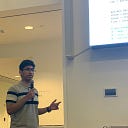Innocence is a Superpower
--
I started this year knowing absolutely nothing about artificial intelligence. In fact, I remember at precisely this time last year, I was taking my first free course in artificial intelligence from Udacity.
Around March, I saw a coronavirus drug design challenge on youtube and wanted to see if I could apply some of my newly learned skills to the challenge. I took a simple already pre-trained LSTM model and applied transfer learning to apply the model to the new SARS-COV-2 main protease.
After this initial step, I was curious to see how I could take the project further, so I started to message some computational scientists to see if they could recommend to me any further steps.
One scientist I reached out to sent this message my way —
Using an LSTM is a tremendous oversimplification of the process involved. I would encourage you to pursue undergraduate and graduate-level training in the field, and be mindful of opportunities as they present themselves.
Obviously, in the exact moment I read the message, I became a little bit discouraged, but looking back on the moment, I realize that it was a type of beneficial growing pain.
From March 2020 till the end of the year, I’ve gained a much better big-picture understanding of drug discovery as a holistic pipeline, and I completely agree with the scientist. My understanding of the field at the time was naïve. It was innocent.
That being said, I wouldn’t be anywhere right now if I hadn’t taken that first step. I could have looked at the complexity of biology and the field and could have given up instantly. Instead, the innocence I had then, and the innocence I have now (present in slightly less quantities but still nevertheless present), act as a shield that prevents me from giving up in the face of such sheer complexity.
I don’t remember the exact podcast, but I remember hearing that kids are capable of incredible curiosity because of innocence. We’re all motivated to work on something that’s meaningful and significant. The work we’re doing may not objectively be significant due to the complexity of the all the different moving components, but moving forward with a given project as if it was significant allows us to gain the mindsets, skills, and confidence to tackle a truly significant project we’ll discover later on in our lives.
I’d expand this idea beyond people who haven’t yet gotten their graduate degree. Aren’t we all innocent? The work that’s been done in the past year using artificial intelligence to design new small molecules to target COVID-19 has not had a direct impact on the well being of patients and the transmission of viral infections. However, here again, the progress we’ve made during the time will surely help us fast track a new therapeutic when the next pandemic comes around.
I come out of 2020 telling myself that I still know 0.00000001% of all there is to know. Whether it’s spiritual development, drug discovery, or biology. But that fact should not scare me away from exploring things further and building my skillset.
Innocence allows you to ask the “stupid” questions that fill up holes that intuition and pattern recognition can’t solve, and it ultimately allows you to create your own path.
